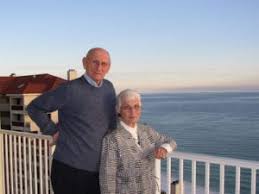He was an All-American player at Indiana State, graduated as the all-time leading scorer in school history, was drafted by the Celtics, had his number retired by his alma mater, and is a member of the Indiana Basketball Hall of Fame. It may sound a lot like Larry Bird…but this is ALSO a description of Duane Klueh, who later returned to Terre Haute to become a coach and remains the winningest coach in school history (although Greg Lansing might catch him later this year). He led the Sycamores during their transition from the NAIA to the NCAA, won 3 conference titles, and made the postseason 5 times during a 9-year span from 1959-1967. HoopsHD’s Jon Teitel got to chat with former player Ray Goddard about the life/legacy of Coach Klueh. Today is Duane’s 95th birthday so let us be the 1st to wish him a happy 1!
Klueh’s coach during his 1st 2 years at Indiana State was future Hall of Famer John Wooden: how much influence did Wooden have on his own decision to become a coach? I think that he had a lot of influence on him and helped him a lot with the way that he played and his coaching style. They were very similar: they rarely raised their voices and were very positive all of the time. When I played for him we ran fast up and down the court, just like Wooden’s teams did.
As a junior at Indiana State he was #2 in the nation with 597 PTS, an All-American, and 1948 NAIA tourney MVP before being picked by the Celtics in the 1949 NBA draft: how good a player was he back in the day, and how did he 1st get into coaching? He was a great player. He was 1 of the 1st players on the night that the NBA started and scored the very 1st point in the league’s history! He was very fast and a good all-around player who was productive. You could tell that he knew a lot about the pro style and used some of that with us.
After the 1947 Sycamore team refused to go to the NAIA tourney due to the organization’s segregationist rules, the 1948 version became the 1st to ever play in a national tourney with an African-American player (Clarence Walker): how did all of that impact his views on race relations? Coach Klueh was way ahead of his time and 1 of the team leaders due to the type of personality he had.
He was named head coach at his alma mater in 1955 at age 28: was his relatively young age an advantage or disadvantage in the locker room? I would say that it was a little of both. He did not have a lot of coaching experience to draw on, but the players of that era listened to you more than they do in today’s world. I think his players listened to him because he was such a great player himself.
He was also a nationally-ranked senior tennis player who led the Sycamores to a school-record 278 wins during his 26-year career as the school’s tennis coach: which sport was he best at, and which sport did he enjoy the most? He would probably say that he loved tennis more than anything but he loved basketball too. He played tennis into his 80s and had several knee operations so that he could continue to play. He could beat all of his players while he was still the coach!
He resigned at age 40 allegedly due to the pressure caused by recruiting: how big a factor was recruiting outside of the D-1 realm, and why could he not just designate 1 of his assistant coaches to do all of the recruiting? In his case he did everything himself. He had an assistant who was a great guy but was not a recruiter and never went out on the road. Coach Klueh recruited some players who could have played at any level. He had a couple of years where he finished runner-up in the NAIA tourney before the school decided to replace him: it was a sad day in Indiana State basketball history.
His 182 wins remain the most in school history: did he realize at the time how prolific a coach he was, and do you think that anyone will ever break his record? He was kind of overlooked while he was actually coaching, but as the years have gone on and we have had some unsuccessful coaches here, people have come to appreciate him a lot more. We have been a little better recently but he is still viewed as our best coach ever. Larry Bird had a great coach as well in Bill Hodges but he got the job by accident after Bob King’s illness.
He is a member of the NAIA Hall of Fame: where does that rank among the highlights of his career? That is probably right up there. The school retired his jersey a few years ago, which was also 1 of his highlights.
When people look back on his career, how do you think that he should be remembered the most? Speaking as 1 of his players, he should be viewed as a great person who handled all of his players in such a way that they would speak highly of him. I do not think that you will find any of his players who have a bad word to say about him: he was a great coach/great person.




